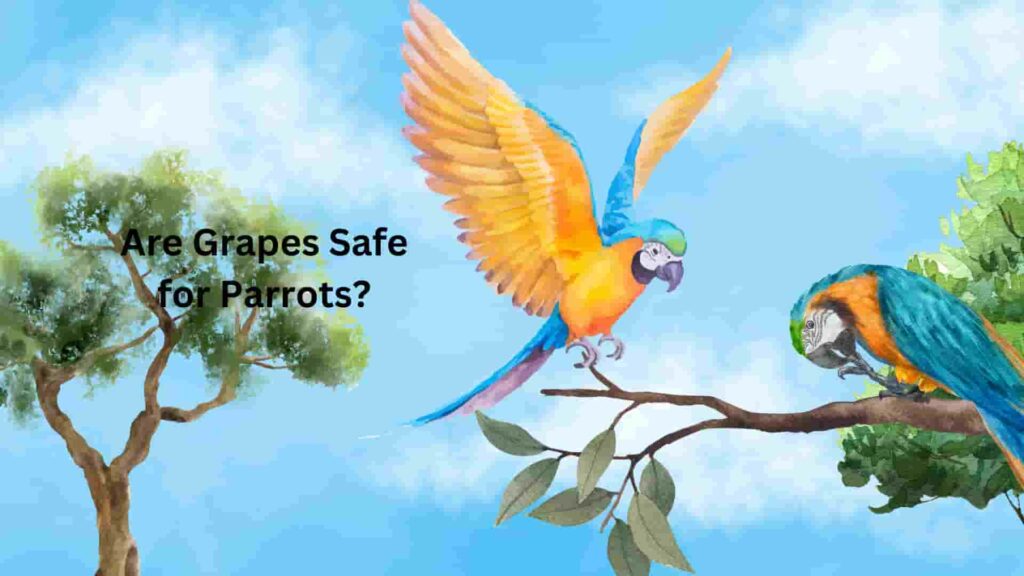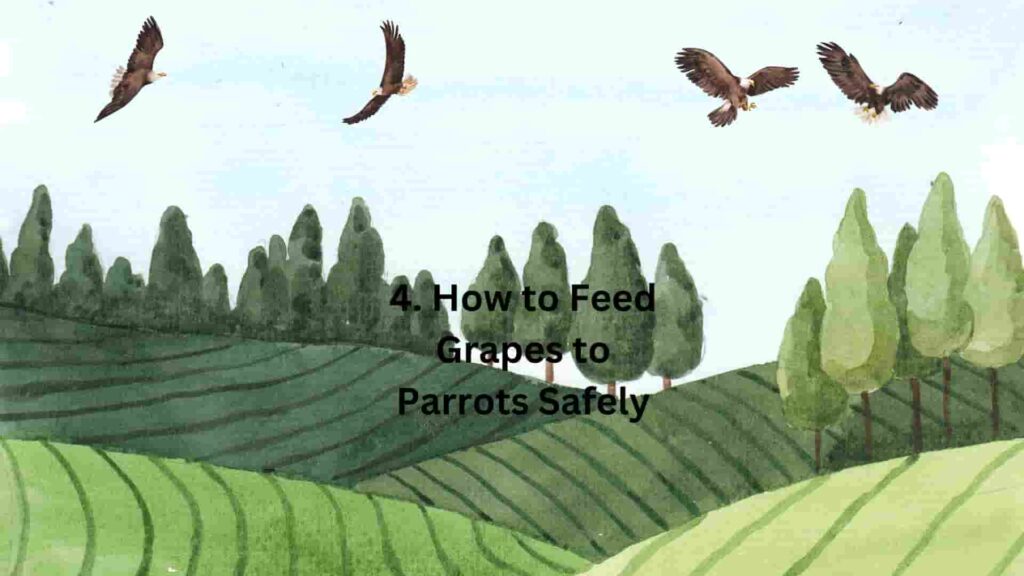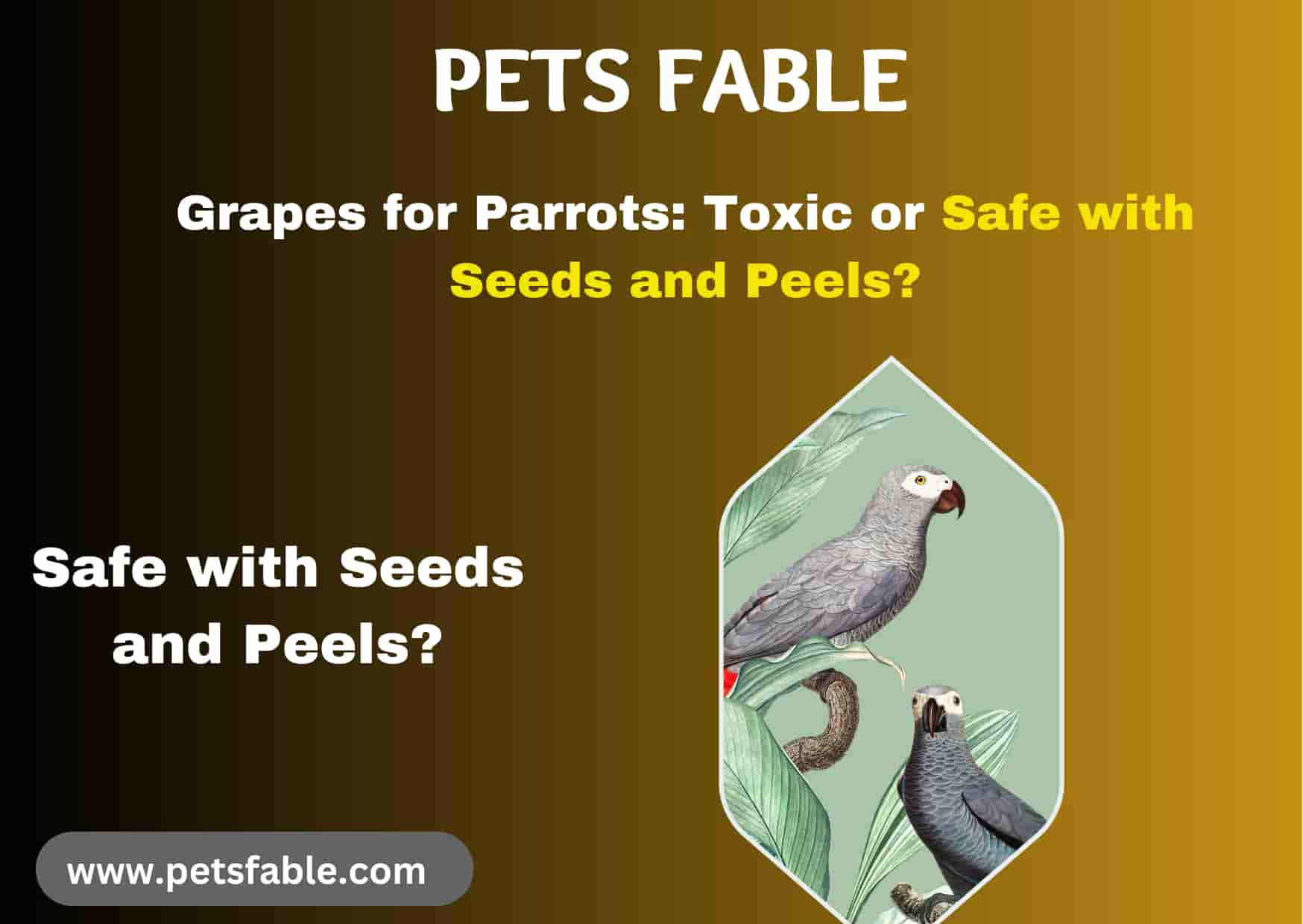Yes, parrots can safely eat grapes, including their seeds and peels! Grapes are non-toxic and can be a healthy, hydrating treat for your feathered friend.
However, due to their high sugar content and potential pesticide residues on the peel, grapes should be given in moderation and with proper preparation. In this guide, we’ll cover the benefits and risks of feeding grapes to parrots, and how to do so safely.
Table of Contents
- Are Grapes Safe for Parrots?
- Can Parrots Eat Grape Seeds and Peels?
- Nutritional Benefits of Grapes for Parrots
- How to Feed Grapes to Parrots Safely
- Potential Risks of Feeding Grapes to Parrots
- Frequently Asked Questions
1. Are Grapes Safe for Parrots?
Yes, grapes are completely safe for parrots to eat. They are a soft, juicy fruit that parrots often enjoy as an occasional treat. Their natural sweetness and easy-to-eat size make them a favorite for many bird species, from budgies and cockatiels to macaws and African Greys.

2. Can Parrots Eat Grape Seeds and Peels?
Grape Seeds
Unlike with dogs and cats, grape seeds are not harmful to parrots. In fact, grape seeds are safe and contain antioxidants that may provide health benefits. However, if you prefer, you can opt for seedless grapes as a convenient alternative.
Also read: parakeet-vs-parrot
Grape Peels
Grape peels are safe for parrots to eat, but they can sometimes contain pesticide residues, especially on non-organic grapes. Thoroughly washing grapes before feeding them is essential to remove any harmful chemicals or dirt.
3. Nutritional Benefits of Grapes for Parrots
Grapes are packed with nutrients that can benefit your parrot’s health when offered in moderation. Here are the key nutritional benefits:
| Nutrient | Benefit for Parrots |
|---|---|
| Vitamin C | Boosts immunity and supports skin and feather health. |
| Vitamin K | Aids in blood clotting and bone strength. |
| Potassium | Supports muscle function and heart health. |
| Antioxidants | Protect cells from damage and promote overall wellness. |
| Water Content | Keeps parrots hydrated, especially in warm climates. |
4. How to Feed Grapes to Parrots Safely
A. Wash Thoroughly
Before offering grapes to your parrot, rinse them well under running water. For extra safety, soak them in a solution of water and vinegar, then rinse again to remove pesticides and bacteria.
B. Serve Fresh
Offer only fresh, ripe grapes to your parrot. Avoid overripe or spoiled grapes, as they may harbor mold or bacteria that could harm your bird.
Also read: are-there-really-purple-parrots-yes-no
C. Cut for Smaller Parrots
For small parrots like budgies, lovebirds, or cockatiels, cut the grapes into halves or quarters to make them easier to eat. Larger parrots, like macaws or African Greys, can handle whole grapes.
D. Offer in Moderation
Because of their high sugar content, grapes should be given as an occasional treat rather than a staple food. Stick to 1–2 grapes for smaller birds and up to 3–4 for larger species per serving.
E. Remove Uneaten Grapes
Grapes can spoil quickly, especially in warm environments. Remove any uneaten pieces from the cage after a feeding session to avoid attracting pests or bacteria.
5. Potential Risks of Feeding Grapes to Parrots
While grapes are generally safe, there are some potential risks to be aware of:
A. High Sugar Content
Grapes contain natural sugars, which can lead to weight gain, obesity, or an unbalanced diet if overfed.

Solution: Treat grapes as an occasional snack, not a daily food.
B. Pesticide Residues
Non-organic grapes may have pesticide residues on their skin, which can be harmful to parrots.
Solution: Always wash grapes thoroughly or choose organic varieties.
C. Choking Hazard
For smaller parrots, whole grapes or large pieces may pose a choking risk.
Solution: Cut grapes into smaller portions for small bird species.
FAQ’s:
Q1. Are red, green, or black grapes better for parrots?
All grape varieties—red, green, and black—are safe and nutritious for parrots. The choice depends on your bird’s preference and availability.
Q2. Can baby parrots eat grapes?
Yes, baby parrots can eat grapes, but ensure they are cut into very small, manageable pieces to prevent choking.
Q3. Can parrots eat raisins (dried grapes)?
Yes, raisins are safe for parrots, but they are much higher in sugar than fresh grapes. Feed them sparingly to avoid excessive sugar intake.
Q4. How often can I give grapes to my parrot?
Grapes should be given 1–2 times a week as a treat, not as a regular part of their diet.
Q5. Are grapevines safe for parrots to chew on?
Yes, grapevines are safe for parrots to chew, provided they are untreated and free of pesticides.
Conclusion
Grapes, including their seeds and peels, are safe and nutritious for parrots when fed in moderation. They provide hydration, antioxidants, and essential nutrients that support your bird’s health.
However, always wash grapes thoroughly, limit portion sizes, and monitor your parrot’s overall diet to avoid excess sugar. With proper care, grapes can be a delicious and healthy addition to your parrot’s treat menu.
